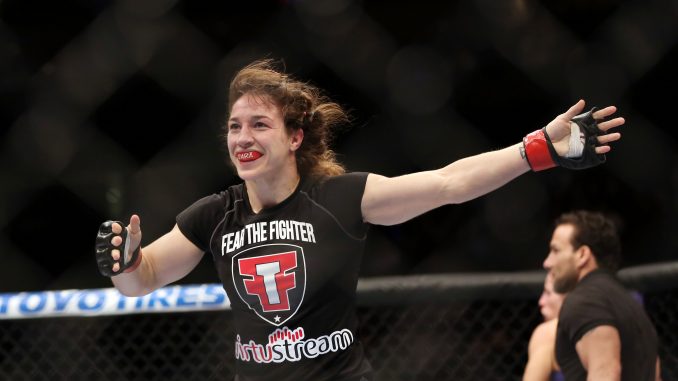
RALEIGH — Sara McMann thought she was ready to return to the Octagon, then she got hit.
“I’m working on my composure and setting things up,” she said after her unanimous decision win over Lina Lansberg at UFC Raleigh, “but she hit a good liver shot at one point, and I knew I didn’t want any more of that. She’s good, and she’s fast, so I didn’t want to deal with that.”
McMann, a former Olympic wrestling silver medalist, was returning to the UFC after a 23-month absence. During her time off, she recovered from an injury — something most UFC fighters contend with at some point in the career. She also gave birth to her second child — son Lucas was born in December 2018.
Coming back from that is, understandably, a different animal altogether.
“Normal injuries are like ligaments, maybe bone,” she said, “and there’s usually like a standard amount of time that it takes for that to recover. And it gradually gets better. When it comes to having a baby, it’s more like getting into a car accident and having internal bleeding. You really shouldn’t do anything. You should be very, very gentle with your body and very, very light.
“But then once it’s healed, you feel almost like 100 percent. You feel normal again. It’s almost like an off and on switch, whereas a lot of my injuries, it’s more gradual. As my ligament gets stronger, my tendon gets stronger, I am able to push it a little further until it’s strengthened.”
The pregnancy was also more predictable that a standard injury, making it easier to prepare for. She made adjustments to her training to help minimize her recovery time afterward.
“I think that part of it is knowing your own body and knowing how to get incrementally better,” she said. “What parts of your workout push you really hard, and what parts are more technical. As I got more and more pregnant, it shifted from the harder workouts to the more technical workouts. Afterward, it just kind of flipped. I started out more technical, working on doing things better. As my body responded and was able to recover, the workouts just got incrementally harder and harder until I got back into the shape I was normally in.”
Still, when she got back into the tough workouts, there was obviously some catching up to do.
“For me, I wasn’t really far off,” she said. “I just felt like a slightly looser, slightly more out of shape — almost like the preseason, when I used to have wrestling seasons. I was like a regular person. It still felt like my body, but I felt more winded. When I pushed my muscles, I wasn’t used to that deep burn and knowing I could just keep going through that. You push into that burn and edge a little further, and then it happens a little later. Before you even know it, you’re like, ‘Oh, man, it wasn’t until we hit the hard conditioning that I felt that deep burn.’”
Getting the chance to make her return in Raleigh had special meaning for McMann, who lived in North Carolina during her high school years. In fact, when she joined the wrestling team for McDowell High School in Marion, she was the only female high school wrestler in the state.
“Initially, it was different,” she said. “I had friends on the team, and they liked me, but there was initial pushback just because they’d never been exposed to it. Guys on my team were like, ‘Oh, you’ll quit’ or ‘The coach will make you quit.’ Like just because I was a girl, maybe something was preventing me from actually being capable of doing wrestling, especially wrestling against guys.”
McMann never doubted herself, though.
“I’d grown up in Pennsylvania,” she said. “So I’d seen girls wrestle guys without a problem. So, for me, I was like, of course I won’t quit. I have two arms and two legs. I can wrestle like anybody else.”
Unlike other females who broke the gender barrier in high school wrestling, who were met with forfeits from boys not willing to face them, McMann had plenty of opponents.
“Mostly, people wrestled me,” she said. “I think a lot of times, their coaches wouldn’t give them the option. Sometimes I’d get forfeits, and that was really frustrating. Luckily, though, it didn’t happen to me as much as it did to other people. A lot of coaches were like, ‘No. Go out and wrestle. We need those points. We can just sacrifice points because you don’t want to wrestle a girl.’”
McMann managed to shake off the shock from her opponent’s initial liver shot in the Raleigh fight and dominated the bout with her wrestling skill, taking Lansberg down repeatedly and grinding out a win on the mat. Now she’s ready for a fight against one of the top five women in the UFC Bantamweight division.
Hopefully, the wait won’t be as long as it was for this fight.
“You can just wake me up out of a dead sleep and be like, ‘Fight!’ and I’d be like, ‘OK!’” she said.



